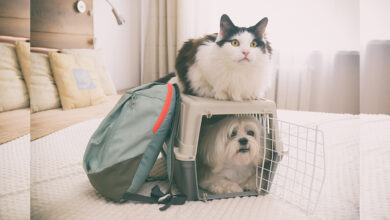Critters & CreaturesMoving
Moving and Pets
Dr. MICHELLE SCANTLAND
When you are ready to move in, pick one room and set up the same pet things that you had in the room before the move. Familiar smells will go a long way to helping your pet feel at home. It will also keep them out of the way while your furniture and effects are unloaded.
Once you are unpacked, and all the boxes are gone, this is your opportunity to let your pet roam. Your pet will smell all of the familiar things, as well as the new. Take them for a walk around the house and be sure to use the same door to let them in and out of the house to avoid confusion. Show your pet where their food and water is and show your cats where their litter box is. Have a play session with their favorite toy, or snuggle with them on the couch or bed (if they are spoiled like my pets are). As you develop routines for feeding and letting them out, your pets will catch on pretty quickly. Try to keep the same routines you had in place at the previous house.
 If you have an outdoor cat, keep them indoors for a couple of weeks at least. If you want to turn them into an indoor cat, this is your chance! If you want them to remain indoor/outdoor pets, it’s important that they realize this is home now. By keeping them indoors for two weeks, they will start to identify this home as their territory. On their first day out put them in a harness and a long lead. Walk them around the yard so they have an idea of your home’s boundaries. You can’t dictate what they will claim as their territory, but it’s worth a shot! Eventually you will have to just open the door and let them go. Micro-chipping is a small insurance policy should your cat decide to wander off.
If you have an outdoor cat, keep them indoors for a couple of weeks at least. If you want to turn them into an indoor cat, this is your chance! If you want them to remain indoor/outdoor pets, it’s important that they realize this is home now. By keeping them indoors for two weeks, they will start to identify this home as their territory. On their first day out put them in a harness and a long lead. Walk them around the yard so they have an idea of your home’s boundaries. You can’t dictate what they will claim as their territory, but it’s worth a shot! Eventually you will have to just open the door and let them go. Micro-chipping is a small insurance policy should your cat decide to wander off.
For dogs, it is important to fence your yard, put them on a harness and long lead, or look into wireless containment systems. Supervision is the key for the first few weeks of letting your dog outdoors. Remember: try to use the same door for consistency.
It can be normal for a dog to refuse to eat during big changes. If this is the case, contact your veterinarian to ensure there is nothing more serious occurring. It is very important that cats eat every day and that both cats and dogs drink fresh water throughout the move. If your pet does not seem to be adjusting or is showing signs of fear or anxiety, do not hesitate to contact a veterinarian for help. They may wish to see the pet, or can refer you to a training facility in the area with certified trainers who can help.
Finding a new Veterinarian
Now that your pet is settled it’s time to find a new veterinarian. A good starting point is your previous veterinarian. If you didn’t have chance to ask for a referral before you left, give them a call. Most owners chose a veterinary clinic due to proximity to their home. Being close is important, especially for emergencies, but a few kilometers either way won’t likely make a big difference.
 It’s important to find a clinic you’re comfortable with. It would be a good plan to visit the clinic and bring your pet along. Speak with the staff, and if you wish, schedule an appointment with a vet for a routine physical exam. Seeing your pet when he or she is healthy allows us to get to know what is “normal” for your pet which can be helpful should your pet get sick. This will also give you an opportunity to meet the veterinarian and ask them some important questions. Trust is vitally important between you and your veterinarian. If you don’t have a good feeling when you leave after your first meeting you’ll still have time to find a new one before your pet is ill. Many clinics employ more than one veterinarian, you can choose to meet with a different doctor, or you can look for a different clinic. Yes that’s right….I’m suggesting you basically interview your new clinic!
It’s important to find a clinic you’re comfortable with. It would be a good plan to visit the clinic and bring your pet along. Speak with the staff, and if you wish, schedule an appointment with a vet for a routine physical exam. Seeing your pet when he or she is healthy allows us to get to know what is “normal” for your pet which can be helpful should your pet get sick. This will also give you an opportunity to meet the veterinarian and ask them some important questions. Trust is vitally important between you and your veterinarian. If you don’t have a good feeling when you leave after your first meeting you’ll still have time to find a new one before your pet is ill. Many clinics employ more than one veterinarian, you can choose to meet with a different doctor, or you can look for a different clinic. Yes that’s right….I’m suggesting you basically interview your new clinic!
Here are a few questions you should ask:
- Hours of the clinic
- Services available and when might you be referred to a larger facility and where is it located
- What are the vaccine schedules compared to your previous clinic, and when should their booster be booked
- Are bilingual services available if required
- How many Veterinarians are there in the practice, and do any of them have any special interests
- What arrangements are made for emergencies
- Fees and payment methods
- Qualifications of staff members
Moving can be a stressful event for both you and your pets. The good news is most pets adapt well and in a very short time will be happily settled into their new home. Before you know it they will be just as energetic, outgoing, frustrating, funny, and loving as they were before the big move!










